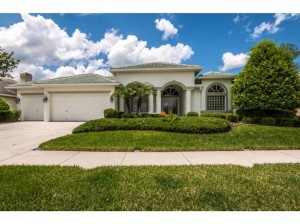Trinity Home: Golfer’s Dream, Chef’s Delight
 An elegant wrought iron entrance is your introduction to the stunning gated community of Spyglass in Fox Hollow.
An elegant wrought iron entrance is your introduction to the stunning gated community of Spyglass in Fox Hollow.
Along a peaceful winding street, you’ll find this special 4 Bedroom/3 Bath/3 Car Garage home situated on the famous Fox Hollow Golf Course.
Framed by lush landscaping, a paved walk is shaded by a barrel entryway and stately columns. Through the classic, etched-glass double doors, the spacious formal living room and dining room welcome you. Inside, glossy hardwood floors reflect the natural light that streams in from beautiful picture windows.
The family room has it all with a see-through fireplace with granite face and wood mantel, plenty of built-ins to house family treasures, triple sliders to the outdoor entertainment area, and open access to the exquisite kitchen that is designed to perfection.
An over-sized breakfast nook looks out over the crystal clear pool with Pebble Tec and waterfall, while the breakfast bar and center island gleam.
Customized kitchen drawers, a built-in wine rack, and polished stainless steel appliances give the room a homey, yet contemporary feel. The master bath is luxurious, accented with brilliant white tones and glass block, dual sinks, and a extra-large double head shower.
A spectacular bonus suite shares the family room fireplace and offers a set of sliders to the pool. It boasts its own full bathroom and heated Jacuzzi tub. Along with a new A/C, you can live the life in this Trinity dream home.



